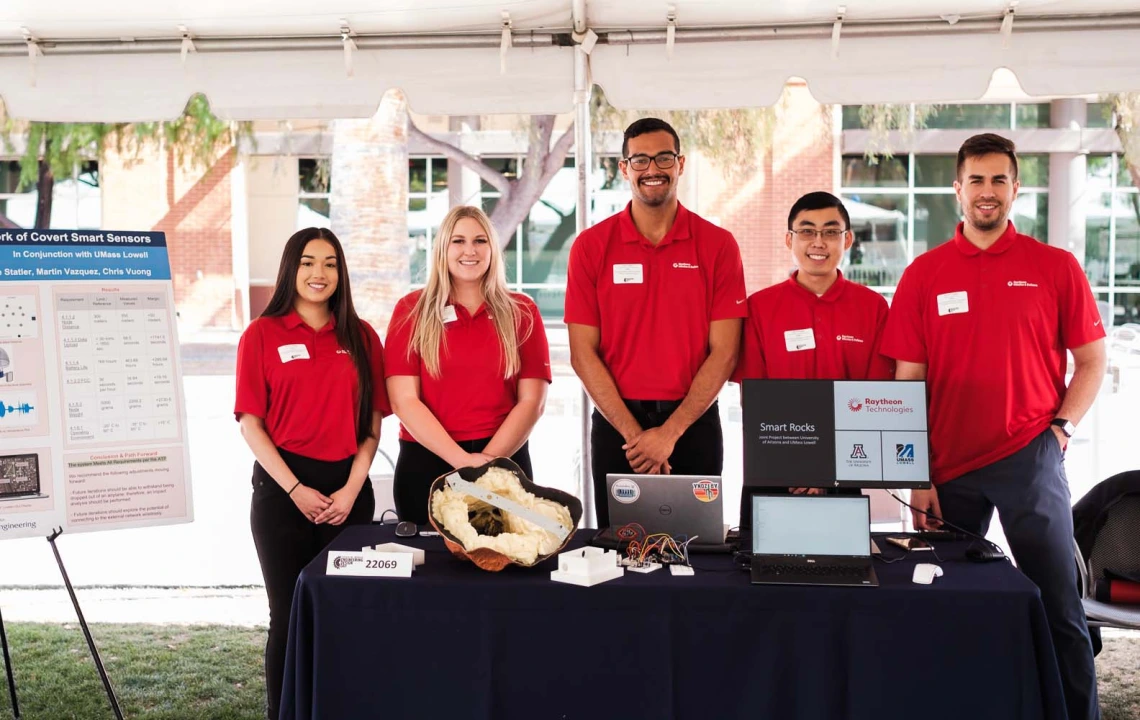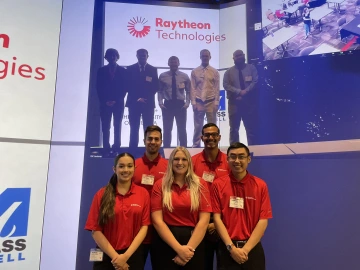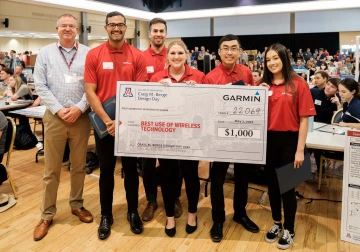UA, UMass Lowell Mesh for Network Success

Project Title: Smart Rocks – A Network of Covert Smart Sensors
Team 22069 Members:
Jesus Alberto Lopez, electrical and computer engineering
Brianna Nicole Robles, systems engineering
Nicole Isabel Statler, project lead, systems engineering
Martin Vazquez, mechanical engineering
Christopher K Vuong, electrical and computer engineering
Sponsor: Raytheon Technologies
With Craig M. Berge Design Day three days away and graduation two weeks in the future, team 22069 traveled to the Raytheon Missiles & Defense headquarters in Tucson on the final weekday in April. The students became the first Interdisciplinary Capstone team to present on-site for Raytheon, a longtime Design Day sponsor and College of Engineering corporate partner.
The team, which designed and built a sensor network disguised as rocks, made up half of a first-ever collaboration with fellow engineering seniors from the University of Massachusetts Lowell.
The UA team was paired with UMass Lowell because the two universities provide the highest number of engineering hires for Raytheon, which employs 15,000 engineers. It was up to the students to decide how to divide the work in creating a self-powered, autonomous system suitable for wildlife, military and security applications requiring discreet area monitoring.
The UA team ended up focusing on power delivery and materials and mechanics – building the housing units, figuring out how to the components would fit inside and testing for durability. Their UMass Lowell colleagues delivered on creating the mesh network and its software. Dividing responsibilities was tough in the beginning, and there were occasional miscommunications, team member and new electrical and computer engineering graduate Jesus Lopez said.
“But by the end, it was actually pretty fun to join up with a team across the country. The judges for our presentation explained to us that a lot of the time, in companies, we will work with people that aren’t nearby,” he said.

For the presentation in April, the UMass Lowell team gathered at Raytheon’s corporate headquarters in Waltham, Massachusetts and joined the Tucson group via videoconference. They switched off with the UA contingent in explaining how the supergroup had met the sponsor’s requirements.
“We asked them to present here because this is Raytheon’s first time sponsoring a joint capstone project, and we wanted this team to have support and a high profile,” said Scott Fiore, project advisor and Raytheon department manager.
This year, Team 22069 delivered three Smart Rocks, or covert sensor nodes, and software that senses temperature, acoustics and motion. They provided a digital architectural model and performed extensive testing to ensure the mesh network functions as planned and that it self-heals in the event of a single node failure.
Several members of Raytheon’s research and development team attended the presentation. During a Q&A, one employee asked whether someone could potentially bypass the security encryption. The team explained that while the encryption came short of being impregnable, they had gone beyond project requirements by including it at all.
A future Interdisciplinary Capstone team may take this project further by adding features like more robust security and the ability to wirelessly connect to an external network. Another area for potential iteration is making the Smart Rocks able to withstand high impact so they could be released from airplanes.
Lopez said he learned a great deal by creating a unique product from scratch.
“Not having a guide to follow helped us be more creative and think of more solutions. We started creating an image of what we wanted in our heads. To see it actually come to life was pretty cool,” he said.
Team 22069 won the $1,000 Garmin Award for Best Use of Wireless Technology at Craig M. Berge Design Day.


